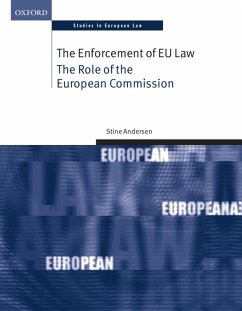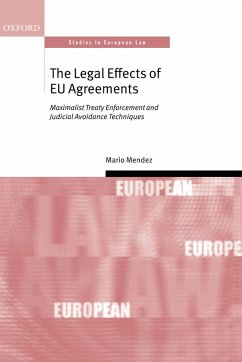
EU Powers Under External Pressure (eBook, ePUB)
How the EU's External Actions Alter its Internal Structures
Versandkostenfrei!
Sofort per Download lieferbar
39,95 €
inkl. MwSt.
Weitere Ausgaben:

PAYBACK Punkte
20 °P sammeln!
EU external actions have deep constitutional and institutional implications for EU law and practices. The EU's competences in external relations have continuously increased, including with the entry into force of the Treaty of Lisbon. As a result, the EU has become ever more active in external relations. This has in turn increased the internal constitutional and institutional effects of EU external actions. This book traces these legal effects and the broader constitutional implications, including potential integrative forces. EU external actions affect the power division between the EU and it...
EU external actions have deep constitutional and institutional implications for EU law and practices. The EU's competences in external relations have continuously increased, including with the entry into force of the Treaty of Lisbon. As a result, the EU has become ever more active in external relations. This has in turn increased the internal constitutional and institutional effects of EU external actions. This book traces these legal effects and the broader constitutional implications, including potential integrative forces. EU external actions affect the power division between the EU and its Member States and between the different EU institutions; the unity and autonomy of the EU legal order; the role and position of Member States on the international plane; their autonomy; the relationship between national, international and EU law; and the ability of EU citizens to identify who is responsible for a particular action or policy, as well as their legitimate expectation that the EU takes action on their behalf. The chapters demonstrate the interpretation of organizational principles, such as sincere cooperation, subsidiarity, primacy and coherence, changes in the context of external relations; how the choice of an external legal basis rather than an internal legal basis affects the powers of the Union and its Member States; what power shifts happen when policies are determined in international agreements, rather than in internal decision-making; and how EU participation in international dispute settlement mechanisms affects the autonomy and legitimacy of the EU.
Dieser Download kann aus rechtlichen Gründen nur mit Rechnungsadresse in A, B, BG, CY, CZ, D, DK, EW, E, FIN, F, GR, HR, H, IRL, I, LT, L, LR, M, NL, PL, P, R, S, SLO, SK ausgeliefert werden.













